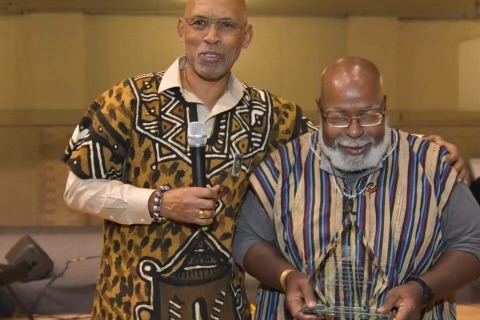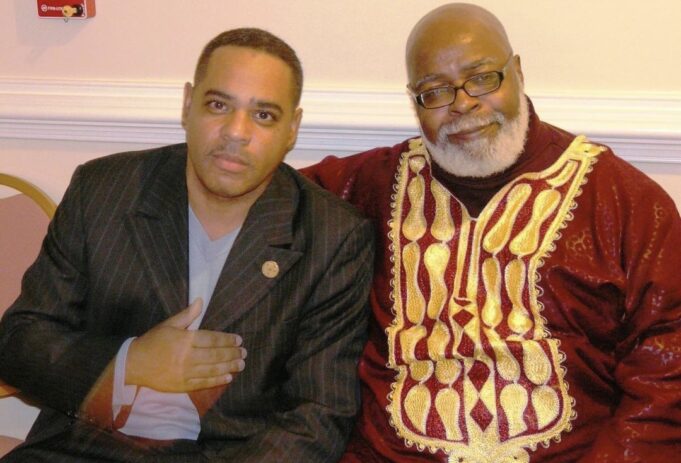While reviewing the legacy left by the chronicler of the Global African Presence and the heir apparent to mantle of scholars Dr. Cheikh Anta Diop and Dr. Yosef Ben-Jochannan, I discovered Dr. Runoko Rashidi in 2010 chaired a conference in Senegal facilitated by then Senegalese President Abdoulaye Wade. According to Truth Africa, “In December 2010 he was president and first speaker at the Diaspora Forum at the FESMAN Conference in Dakar, Senegal.”

Dr. Rashidi became an ancestor on Aug. 2 while conducting a tour in Egypt. According to author, publisher, cultural historian and educational consultant, Anthony T. Browder, after viewing Dr. Rashidi’s history of the African presence in the world YouTube videos, “The Senegalese president reached out to Runoko, had a conversation with him, and from that exchange an international conference” based on his, and likeminded scholars’ contributions was born.
During an interview with Africa Watch, Browder, who is director of the ASA Restoration Project funding the excavation and restoration of the 25th dynasty tomb of Karakhamun in Luxor, Egypt, said “they had a delegation of 120 African Americans, the president sent a private plane, all expense paid, to transport them back and forth to and from Senegal.”
Browder agreed with this writer that Dr. Rashidi gave incredible answers to the Honorable Elijah Muhammad’s incredible question: “Who is the Original Man?” As Truth Africa noted, Dr. Rashidi was an anthropologist and historian with a major focus on what he called the “Global African Presence”—that is Blacks living and moving outside of Africa before and after enslavement.
News of his passing was announced by his family. The statement in part read: “It is with our most sincere and deepest regret that the family of Dr. Runoko Rashidi announced the sad news that he has transitioned into the ancestral realm … He was on tour in Kmt (Egypt), doing what he loved most. He will be greatly missed.”
I’m terribly saddened, said Dr. Wesley Muhammad, who received his graduate degree and Ph.D. in Islamic studies from the University of Michigan. The author of several books, including God’s Black Prophets: Deconstructing the Myth of the White Muhammad of Mecca and Jesus of Jerusalem and Black Arabia and the African Origin of Islam, Dr. Muhammad added, “This is a great loss for us as a people, in terms of warrior scholarship.

‘Baba’ Runuko Rashidi was definitely the legitimate heir to Dr. Ben-Jochannan, Dr. Cheikh Anta Diop.” He noted, “That generation of intellectual luminaries that blazed the trail … of scholarship and really taking it (to) the next level. You know the J.A. Rodgers’ and Drusilla Houstons’, they were great (chroniclers of our history) but what Ivan Van Sertima, Dr. Ben and Dr. Diop (did) they took it to that next level.”
What is the next level? Dr. Muhammad explained, “In terms of the critical methodology used by the academy (traditional universities and such institutions) it was necessary for Dr. Diop to not just to be certified, but to employ the methodology of the academy in order to prove Egypt Black. Just the anecdotal-type data for example we find in J.A. Rodgers … or Gerald Macy and those whom Drusilla Houston relied on” was not readily accepted by academics.
“Black African centered scholarship had to be taken to that next level in terms of methodology. And that’s what that generation Diop and Leonard Jeffries and Dr. Ben did … they gave us material with data and scholarship that we can use in academic conventions and use to debate. And that is very important.”
Dr. Muhammad said coming through the academy, scholars who seek to stay in the academy find themselves having to “make a decision.” “To do African-centered scholarship freely in a liberating way, which will in turn be liberating for African readers … you will bump against the protocols of the academy, and (in that) there will be a fight,” he said.
According to Dr. Muhammad, Dr. Rashidi enjoyed the luxury of not being “handcuffed.” His presentations didn’t rely on the acceptance or accreditation of the academy, giving him freedom and not “beholden to the culture of the academy.”
Browder said Dr. Rashidi through social media, YouTube presentations, periodic educational world tours, and his substantial list of published works created a network larger than any he could attain on a university campus. Dr. Rashidi was in effect a self-contained university that Browder said needs to be studied, and Dr. Muhammad said needs to be replicated and enhanced.
Dr. Muhammad said unlike Dr. Rashidi most in academia are beholden to the culture of the academy. He said Black scholars may be “brilliant but nobody knows about them.” They are unable to “dispense that knowledge in a way that the people will happily consume,” he said, unlike Baba Rashidi. And, Dr. Muhammad said the academy is an extension of White supremacy.
Dr. Rashidi is the author or editor of 22books, including “My Global Journeys in Search of the African Presence,” “Assata-Garvel and Me: A Global African Journey for Chidden in 2017” and “The Black Image in Antiquity in 2019.” His other works include “Black Star: The African Presence in Early Europe,” published by Books of Africa in London in November 2011 and “African Star over Asia: The Black Presence in the East,” published by Books of Africa in London in November 2012 and revised and reprinted in April 2013, “Uncovering the African Past: The Ivan Van Sertima Papers,”published by Books of Africa in 2015. Additional works include the “African Presence in Early Asia,” co-edited by Dr. Ivan Van Sertima. Four of Dr. Rashidi’s works have been published in French.
As a traveler and researcher, Dr. Rashidi visited 124 countries. As a lecturer and presenter, he spoke in 67 countries.
Dr. Rashidi worked with and under some of the most distinguished scholars of the past half-century, including Ivan Van Sertima, John Henrik Clarke, Asa G. Hilliard, Edward Scobie, John G. Jackson, Jan Carew and Yosef Ben-Jochannan.
In October 1987, Dr. Rashidi inaugurated the First All-India Dalit Writer’s Conference in Hyderabad, India.
In 1999 he was the major keynote speaker at the International Reunion of the African Family in Latin America in Barlovento, Venezuela. In 2005 Dr. Rashidi was awarded an Honorary Doctorate degree, his first, by the Amen-Ra Theological Seminary in Los Angeles. In August 2010, he was first keynote speaker at the First Global Black Nationalities Conference in Osogbo, Nigeria.
Follow @jehronMuhammad on Twitter.













